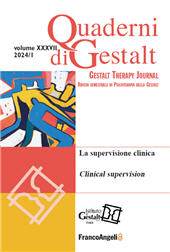La supervisione gestaltica in età evolutiva
51-66 p.
L'obiettivo di questo articolo è di dare attenzione alla supervisione della psicoterapia con bambini e adolescenti. Infatti, nonostante la supervisione sia una parte di vitale importanza della formazione clinica in psicoterapia infantile, non sembra esistere molta letteratura in proposito. In particolare, si vuole qui sottolineare la specificità del lavoro clinico con i minori, che ci chiama ad una maggiore responsabilità sia per la giovane età dei pazienti, sia per la molteplicità degli elementi del campo in cui ci muoviamo, come terapeuti e come supervisori. Viene di seguito presentato un caso di supervisione che mostra la complessità del lavoro con i minori, il bisogno di confrontarsi con diversi attori, la delicatezza dell'incontro con il piccolo paziente, la necessità di lavorare dentro e fuori il setting.
Attraverso la descrizione del caso clinico, verrà illustrato come lavorare in supervisione attraverso i livelli di riconoscimento del modello di Spagnuolo Lobb (2024). Tale modello ci consente sia di includere la complessità della situazione in cui minore e terapeuta sono inseriti, sia di sostenere, attraverso il riconoscimento, le risorse e l'intuito del terapeuta. [Testo dell'editore].
The aim of this article is to give attention to supervision in childhood and adolescence. Although supervision is a vitally important part of clinical training in child psychotherapy, it does not seem to have been addressed adequately in the literature. This article will also emphasise the specific characteristics of therapeutic work with children and adolescents, which requires supervisors and supervisees to share knowledge of the complex world of minors and its ecosystem (Dowling Kitchener, 2023). This work also requires greater responsibility on the part of the supervisor, both due to the young age of the patients and the complexity of the field in which we move as therapists and as supervisors.
The content in this article stems from the author's experience as an individual and group supervisor of psychotherapists who work with children and adolescents in both private and institutional contexts. The reflections that are brought forward also emerge from the context of the international training for supervisors at the Gestalt Institute HCC Italy, where she leads a seminar on supervision in the developmental age according to Margherita Spagnuolo Lobb's model (Spagnuolo Lobb, 2024). The supervision case presented here is not intended to be an exhaustive example of supervision in the various stages of development, but rather is an interesting example, because it shows the complexity of working with minors, the need to deal with different actors, the delicacy of the encounter with the young patient, and the need to work inside and outside the setting.
Following Spagnuolo Lobb's supervision model, we will see how the supervisor gives support to the therapist's intentionality of contact, knowledge, and resources, while maintaining a broader view of the situation. Through a clinical case, we will see how to work in developmental supervision through specific realms of recognition, also including the therapist's relationship with parents, family, and the social and educational community. [Publisher's Text].
-
Articles from the same issue (available individually)
-
Information
ISSN: 2035-6994
KEYWORDS
- Supervisione gestaltica, Psicoterapia infantile, Intenzionalità, di contatto, Reciprocità, Riconoscimento
- Supervision, Child psychotherapy, Intentionality of contact, Reciprocity, Recognition


